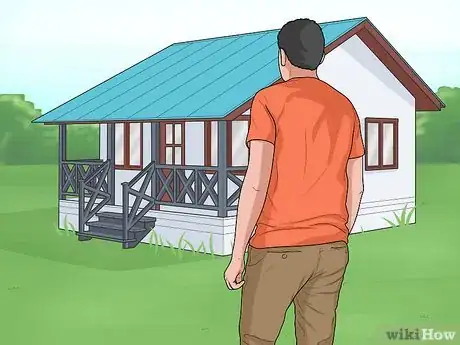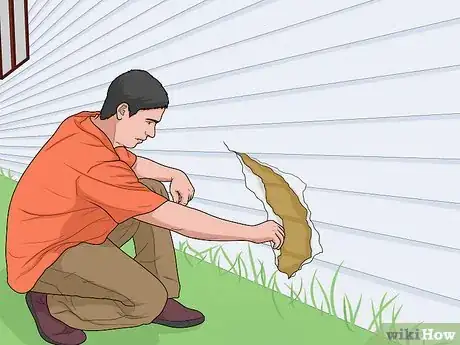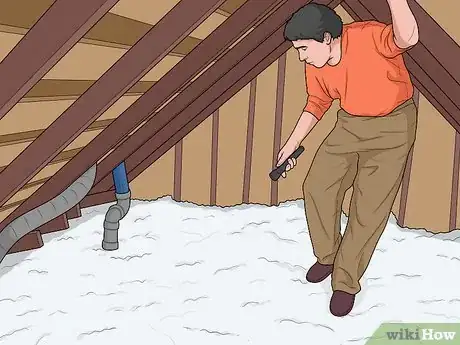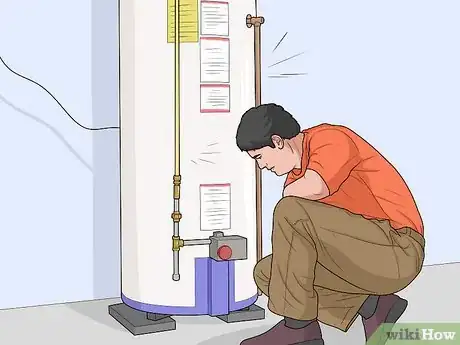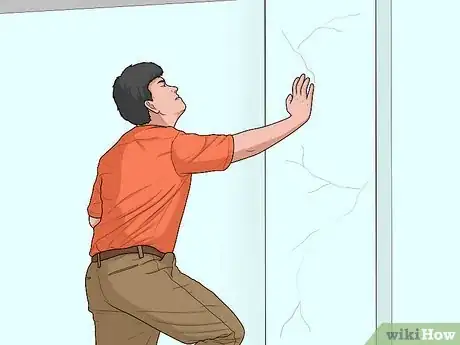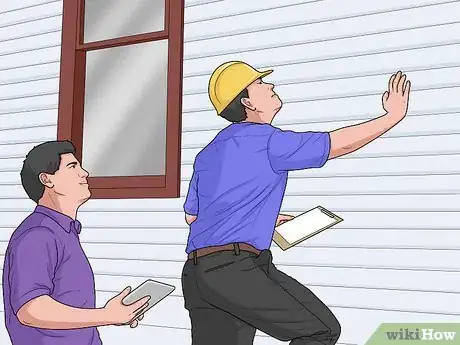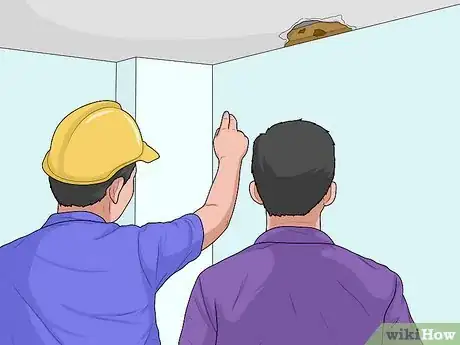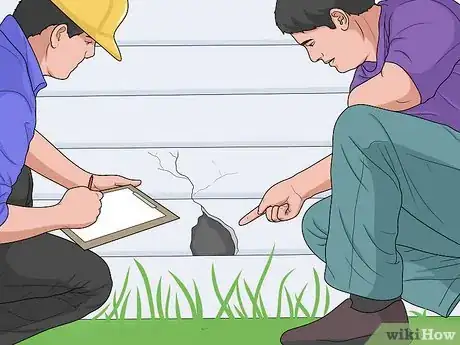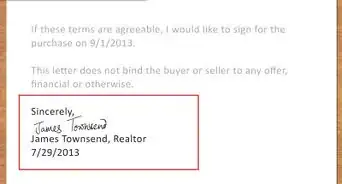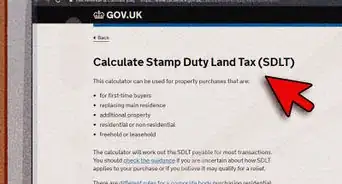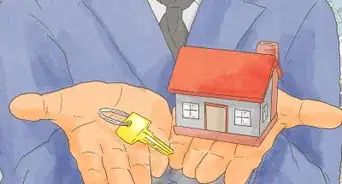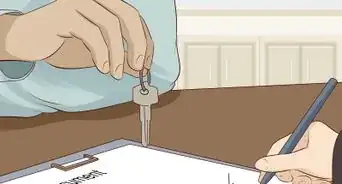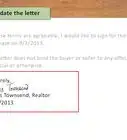This article was co-authored by Carla Toebe and by wikiHow staff writer, Jennifer Mueller, JD. Carla Toebe is a licensed Real Estate Broker in Richland, Washington. She has been an active real estate broker since 2005, and founded the real estate agency CT Realty LLC in 2013. She graduated from Washington State University with a BA in Business Administration and Management Information Systems.
This article has been viewed 106,967 times.
For most people, buying a home is the largest purchase they'll make. Before you buy a home, you must perform an inspection. You can do an inspection yourself before you even make an offer on the house. Once the sellers have accepted your offer, hire a licensed inspector to look over the home and make sure there are no costly repairs that need to be made. Based on the inspection report, you can negotiate the price of the home with the seller.
Steps
Making an Initial Inspection
-
1Walk the grounds. You can learn a lot about the condition of a house by walking around the land surrounding it. Check the quality of the lot and driveway as well as the condition of any exterior structures, such as a freestanding garage or storage unit.[1]
- Try to come look at the house when it's raining. You can observe the lot's drainage and make sure water is flowing away from the house.
- Be on the lookout for any standing water or debris. If there are any large trees near the house, they shouldn't have branches hanging over the house that could damage the roof.
-
2Look over the exterior of the house. You want to inspect the structure of the house both outside and inside. The sides of the house and the roof should be straight. Make sure nothing is bowed or sagging, and that the siding or paint is in good condition.[2]
- Check any visible foundation and make sure there aren't any exterior cracks. If the house has siding, look for dents or damage.
- Look at the roof from the ground. Take note of any missing or damaged shingles. Make sure the gutters are clean and in good repair.
- Take note of anything you see so you can discuss it with the seller before you put in an offer on the home.
Advertisement -
3Do a complete walkthrough of the interior. Your personal inspection of the interior can give you a good idea of whether you want to place an offer on the home. Look at the condition of the flooring and walls and make note of any damages.[3]
- If the house is dirty or contains old property from the sellers, and is not being sold "as is," you may want to ask the sellers to clean it up first.
- Some interior damages won't affect the selling price of the home, because they're simply considered part of moving into a new home. For example, you won't get very far demanding that the house be repainted since most people repaint the interior of a home when they move in.
- Make note of any damaged cabinetry, flooring, or other surfaces in the house, as well as any places where the floor creaks or appears uneven.
-
4Go up in the attic. In the attic of the home, look closely at the insulation and at the condition of the rafters. If you see long, pencil-like protrusions from the rafters, they may be signs of a termite infestation.[4]
- You also want to make sure there aren't a lot of extra holes in the rafters, and that the boards all appear solid and even. There shouldn't be any signs of rot.
- You don't have to have a lot of experience with home repair to recognize a potential problem. If something doesn't look right, make a note of it.
-
5Listen to the water heater. A water heater that is gurgling or banging may need to be cleaned or need more extensive repairs. If you hear any irregular sounds coming from the water heater, ask the seller about it.[5]
- Also check the area around the water heater. Make sure the exterior of the unit is solid and there isn't any water or sediment around the unit itself. A sagging floor around or under the water heater may indicate previous flooding.
-
6Check the foundation for cracks. Depending on the age of the house, hairline cracks in the foundation typically aren't anything to worry about. However, wider cracks may be an indication of significant structural problems with the house.[6]
- If you see larger cracks, ask the sellers about them. Try to find out how long the crack has been there and whether it has grown over time.
-
7Examine the wiring. At the electrical box, you want to be on the lookout for any spliced wires hanging outside the box, or any evidence of sloppy electrical work. Sloppy wires at the box typically are a good indication that there may be problems elsewhere.[7]
- Find out from the seller when the last electrical repairs were made, and who did the work. If it was done by someone unlicensed or inexperienced, you may have a more significant electrical problem on your hands.
Hiring a Licensed Inspector
-
1Ask the seller for disclosures. Before you hire a professional home inspector, find out if the sellers have any disclosures they wish to make regarding the condition of the property. You can provide this information to your inspector, though they will perform checks of everything on their own.[8]
- In some areas, sellers are required by law to disclose certain types of defects, such as termite problems.
- Even if the seller doesn't have any disclosures, you still need to hire an inspector before buying the house. Sometimes sellers may not be aware of certain issues with the property or may have been living with the problem for so long they don't even think about it.
-
2Talk to your real estate agent. Typically, your real estate agent will have particular inspectors they use on a regular basis to conduct home inspections on behalf of their clients. They'll also know the reputations of local inspectors.
- If you noticed any potential problems in your personal walkthrough of the property, bring these up to your real estate agent before you place an offer on the house.
- Your mortgage broker also may have a particular inspector they want to use. If that's the case, they'll usually let you know in advance.
- Typically the buyer foots the bill for the inspection. Your real estate agent can give you a good idea of what to expect from the inspection and how much it will cost you.
-
3Check the inspector's credentials. Before you hire an inspector, you need to make sure that their license is up to date and that they have experience inspecting homes such as the one you plan to purchase.[9]
- Find out how long the inspector has been doing residential home inspections, and how many they've done. You also may want to find out if those houses are similar in size and location to yours.
- Ask the inspector how long they expect the inspection to take, and what parts of the house will be covered. If there's anything that you want to be inspected that won't be covered, you may need to hire a different inspector to go over that part of the house.
-
4Attend the inspection. Schedule the inspection at a time you'll be available and make arrangements to be there. The sellers may want to be there as well. Walk through the house with the inspector and have them explain what they see.[10]
- The inspector likely will notice things that you didn't realize were signs of a problem when you walked through the house on your own.
- If the inspector points out anything that you don't understand, ask them to explain the damage and what would need to be done to repair it.
-
5Line up additional inspections. A general licensed inspector doesn't always go into detail regarding specific systems or issues. If potential problems are found, you may need to have a specialist come in and assess that damage.[11]
- For example, if the home has a septic system, you may want to arrange to have that system inspected separately by a septic system expert.
- A septic system contingency requires a septic tank to be pumped and inspected if there is no proof that it has been done in the past 12 months.
- Most general home inspections don't inspect in-depth for termites. If your general inspector noticed termite damage, you should call in an expert on wood-destroying insects.
- Licensed inspectors also may not look at certain parts of the property, such as separate buildings or pools.
- Additionally, general inspectors only look at what is visible. Any evidence of visible damage could indicate a more significant problem inside the walls or underground.
- Inspectors will look in hard to reach areas, like the attic, on top of the roof, and in the crawl spaces below the house.
- An inspector typically will not check underground sprinkler systems.
Negotiating with the Seller
-
1Go over the inspection report. Once your inspector has finished going through the house, they'll produce a written report of their findings. Have the inspector talk about the report with you and explain each of the items they've listed.
- Seldom will a home inspection come out completely clean with no damages or potential problems at all. An inspector may give an idea of how old a system will be and how much longer it may last.
-
2Identify repairs that must be made immediately. In the worst case scenario, the inspector uncovers a significant problem that directly impacts your ability to move into the house after buying it.[12]
- This is more likely to be the case if you're buying a home that has been unoccupied for a significant period of time, or if you're buying a foreclosed or abandoned house.
- Even if the house is being sold "as is," you still may be able to get a credit for some major structural repairs, such as to the foundation.
-
3Get an estimate for repairs. Even if your home inspector provided a cost estimate in the inspection report, you still may want to get your own. An estimate from a specialist may differ greatly from what the inspector told you.[13]
- Having more than one estimate also gives you a range of prices, so you can bargain with the seller better.
- If your budget is tight, look for licensed repairmen and general contractors who are willing to provide a free estimate.
-
4Ask the seller for a credit for repairs. If there are repairs that must be made before you move into the house, you can either ask the seller to complete those repairs or deduct the cost of repairs from the price of the house.[14]
- The buyer will order the house inspection and is not obligated to release the information, but it is useful for them to point out repairs they are asking to be paid by the seller.
- Start with your lowest offer – usually that the seller pays for all repairs listed in the report, no matter how minor. The seller then gives you a counter-offer. You can make a counter-offer to their counter, but after that, the seller must either accept or deny it.
-
5Avoid sharing your own thoughts. When you're negotiating to get the seller to pay for repairs, you don't necessarily want them to know what your plans are for the property. How you feel about something could affect the amount the seller is willing to pay.[15]
- For example, suppose the inspection revealed there are repairs that need to be made to the heating and air-conditioning system in the home. However, you plan on replacing that system with a more energy efficient model. Revealing to the seller that you plan on replacing the system anyway is a sure way to ensure they won't pay for even a portion of the repairs to the old system.
Expert Q&A
-
QuestionHow does a buyer know if there has been a bidding war on a house?
 Carla ToebeCarla Toebe is a licensed Real Estate Broker in Richland, Washington. She has been an active real estate broker since 2005, and founded the real estate agency CT Realty LLC in 2013. She graduated from Washington State University with a BA in Business Administration and Management Information Systems.
Carla ToebeCarla Toebe is a licensed Real Estate Broker in Richland, Washington. She has been an active real estate broker since 2005, and founded the real estate agency CT Realty LLC in 2013. She graduated from Washington State University with a BA in Business Administration and Management Information Systems.
Real Estate Broker A buyer can ask the seller or listing agent if there have been multiple offers made before they submit their offer or if there are any offers on the house. A buyer can potentially submit an escalation clause that will raise their offer to a higher amount if necessary but these clauses are sometimes forbidden by the seller and just wants the highest and best from the multiple buyers.
A buyer can ask the seller or listing agent if there have been multiple offers made before they submit their offer or if there are any offers on the house. A buyer can potentially submit an escalation clause that will raise their offer to a higher amount if necessary but these clauses are sometimes forbidden by the seller and just wants the highest and best from the multiple buyers.
References
- ↑ http://www.totalhomeinspection.com/totalhomeinspectionchecklist.pdf
- ↑ http://www.totalhomeinspection.com/totalhomeinspectionchecklist.pdf
- ↑ http://www.totalhomeinspection.com/totalhomeinspectionchecklist.pdf
- ↑ http://www.totalhomeinspection.com/totalhomeinspectionchecklist.pdf
- ↑ http://www.popularmechanics.com/home/interior-projects/how-to/a3431/best-home-inspection-checklist/
- ↑ http://www.popularmechanics.com/home/interior-projects/how-to/a3431/best-home-inspection-checklist/
- ↑ http://www.popularmechanics.com/home/interior-projects/how-to/a3431/best-home-inspection-checklist/
- ↑ http://www.nolo.com/legal-encyclopedia/get-house-inspection-before-buying-29749.html
- ↑ https://portal.hud.gov/hudportal/HUD?src=/program_offices/housing/sfh/insp/inspfaq
- ↑ https://portal.hud.gov/hudportal/HUD?src=/program_offices/housing/sfh/insp/inspfaq
- ↑ https://www.nachi.org/sop.htm
- ↑ https://www.zillow.com/blog/negotiating-after-home-inspection-140771/
- ↑ https://www.zillow.com/blog/negotiating-after-home-inspection-140771/
- ↑ https://www.zillow.com/blog/negotiating-after-home-inspection-140771/
- ↑ https://www.zillow.com/blog/negotiating-after-home-inspection-140771/
